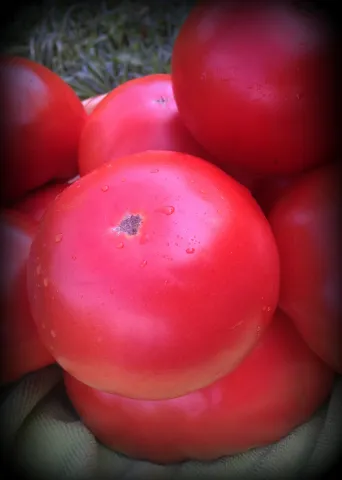Growing Tomatoes Part I: Intro and Site Selection

Written by: Natalie Bumgarner and Anthony Carver, University of Tennessee Extension Agents
Submitted by: Shannon DeWitt, UT Extension Union County Agent
As the most popular crop grown by home gardeners in Union County, tomatoes are certainly king of the garden. This is definitely because of the number of participating gardeners, but it is also due to gardeners’ passion about their home-grown tomatoes.
The number and variety of tomatoes currently on the market and maintained through personal seed saving is a testament to the importance of this botanical fruit that is most often referred to as a vegetable. Tomatoes are a great source of vitamins C and A, as well as lycopene, which has been shown to be beneficial to cardiovascular health.
Gardeners must make two important decisions related to the types and cultivars of tomatoes for the home garden. The first is related to the determinate or indeterminate habit of the plant.
Determinate tomatoes are typically shorter and can be easier to manage in the garden. Determinate tomato fruit are set over a relatively short period of time and then ripen over four to five weeks.
Indeterminate plants may produce over a longer period of time for fresh eating throughout summer and info fall. Indeterminate tomatoes are taller and require taller stakes to provide good support. Unless damaged by insects, disease or environmental stress, indeterminate tomatoes will produce until killed by low temperatures in the fall.
Also consider the time available to invest in plant support, training, disease and pest control, and picking throughout the season.
Tomato cultivar selection is important, but the selection or production of the quality of the plants is also crucial. Tomato fruit yield and garden performance begin with high quality plants. Whether grown or purchased, tomato plants should be stocky with strong root systems. Plants that have been grown with suboptimum light or improper temperature conditions will often be “leggy” or have thin stems with larger distances between leaves. Also look for transplants that have a healthy green color and are free from damaged or yellowed leaves that indicate insects or plant stress. Inspect leaves for any sign of disease.
Avoid purchasing transplants grown out of state, as these have been a major source of disease problems in Tennessee gardens. Purchase locally grown transplants, if possible. Tomato plants are commonly six to eight weeks old when ready for garden planting. All transplants should be “hardened off” before planting. This term refers to slowly subjecting plants to outdoor conditions to lessen their stress at transplant and help them to better handle the sun, wind and temperatures they will experience in the garden.
In the next article, we will discuss soil preparation, fertilizing, weed control. For more information, please contact Shannon DeWitt, UT Extension Union County (865) 992-8038 or sdewitt@utk.edu
- Log in to post comments
Tomatoes
Great informative article. Thanks Shannon!